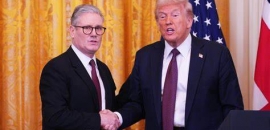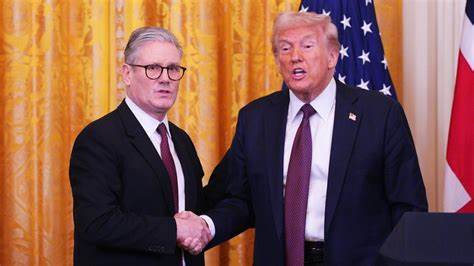
U.K. Prime Minister Keir Starmer is set to visit the White House. Here's what to know
Feb 28, 2025
by Lars Banilue Feb 28, 2025

LONDON — In the five weeks since President Trump took office, the Atlantic Ocean has rarely looked wider.
A chasm has opened between the United States and its European allies over Trump's handling of Ukraine, Russia, Gaza and cross-border trade.
The U.S. is the European Union's biggest trading partner, and this month it hit European and other countries with 25% tariffs on steel and aluminum. Trump is threatening more, saying the European Union has been "very unfair" to America.
On Feb. 14, Vice President JD Vance gave what analysts called an "extremely confrontational" speech to U.S. allies at the Munich Security Conference, declaring there was a "new sheriff in town" and accusing European leaders of censoring right-wing voices — comments that drew strong rebukes.
And last week, European leaders were aghast as the Trump administration held talks with Russia toward a possible peace deal for Ukraine — without Ukraine or any of its European neighbors at the table. Members of the Trump administration have cast doubt on European security as a priority. And the U.S. and Ukraine are negotiating a deal over rare earth mineral resources in exchange for war aid already given, with President Trump citing a price tag much higher than the actual amount.
Many European leaders consider the deal Trump is offering Ukraine unfair, and worry that an emboldened Russian President Vladimir Putin might invade more of their neighbors. After President Trump called Putin earlier this month, Elie Tenenbaum, a security expert at the French Institute for International Relations, told NPR that European leaders were facing a "nightmare scenario."
Into this scenario now walks a mild-mannered former human rights lawyer who's been the United Kingdom's prime minister for just over six months: Keir Starmer.
Starmer, a centrist, will be in Washington on Thursday, following Monday's White House visit by French President Emmanuel Macron. Starmer, analysts say, will be hoping his announcement of a landmark increase in U.K. defense spending on the eve of his visit will send a signal to Washington that Britain is willing to lead in boosting Europe's security — and will help ease relations with the president, who has long demanded NATO allies contribute more to Europe's defense.
Starmer said Tuesday that Britain would increase its defense spending to 2.5% of economic output by 2027, telling the House of Commons that it marked the biggest sustained increase in defense spending since the end of the Cold War. The U.K. will slash its aid budget to pay for this new expenditure.

Feb 28, 2025

Apr 24, 2025

Feb 21, 2025

Apr 16, 2025

Feb 28, 2025

Mar 15, 2025

Mar 09, 2025

Apr 21, 2025